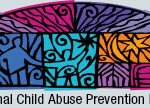
In 1983 April was proclaimed Child Abuse Prevention Month by the president. I don’t know how April was chosen but it doesn’t matter. The important thing is that we have a month where there is an extra effort made to stop this awful behavior that is so rampant in our society.
According to Children’s Bureau (U.S. Department of Health and Human Services) there were 686,000 children abused or neglected in the fifty U.S. states, DC, and Puerto Rico. Of those, 1640 died. Many of those could have been prevented with good community programs in place such as early childhood development programs, parental support, and maternal mental health.
The Child Welfare Information Gateway provides some good information on how to help your community prevent child abuse.

This is a cause that is very near and dear to my heart. I have spent a great deal of my life fighting this battle. I worked as a child advocate for many years and I continue to do what I can to prevent child abuse. This is a cause you can join as well. There are many organizations joining in this fight this month. I noticed when I stopped at In N Out Burger (my favorite burger joint) they have a program this month where they are collecting donations and matching 3 to 1 whatever they collect up to $250,000. Many other businesses are doing similar things. This is one way to help, but for those of you who can, getting personally involved is the best way.
Teresa Burrell, Author, Attorney, Advocate
Author of The Advocate Series
